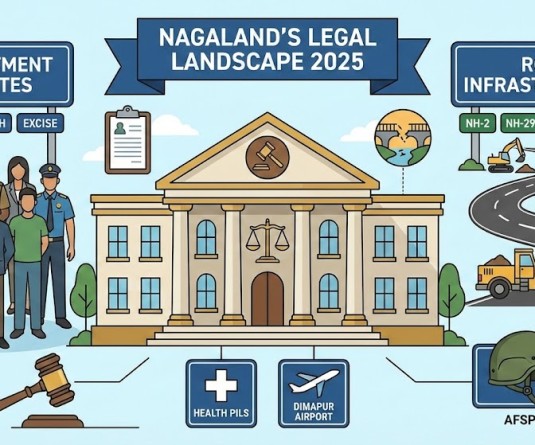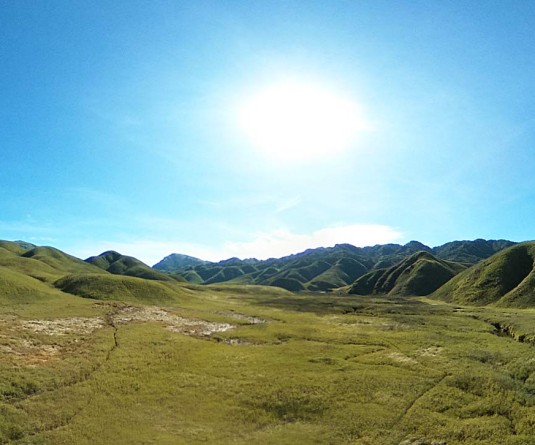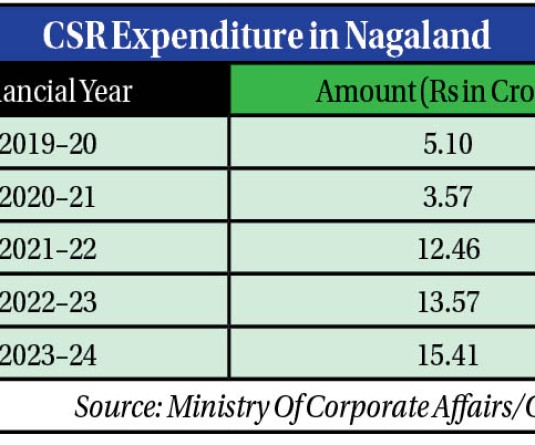An old man sunbaths outside the morung with his pet dog on a lazy Sunday morning at Monyakshu village, Mon District. (Photo Courtesy/Meren Pongen)
Monyakshu village in Mon district bordering Myanmar is a living testimony of neglect - with crippling education, health and sanitation sectors- just like any other villages along the border
Limasenla Jamir
Monyakshu (Mon)| November 2
Situated at 1650 meters above sea level along the Indo-Myanmar border, Monyakshu village gives the impression of natural beauty, serenity and divinity with the massive green hills surrounding it. With more than 900 households and a population of 6,886 people (2011 Census), Monyakshu village is among one of the biggest villages in Mon district.
Women and young girls pounding rice, kids running around carrying their younger siblings at the back, old men sunbathing outside the morung while others busy themselves by weaving or making daos and muzzle loading guns at the blacksmith station- this is how a normal day looks like in this Konyak Naga village. Everything appears to be blissful until you look a little deeper.
About half of the populations are children. An average family consists of nine to ten members. With the system of joint family being practiced in the village, the village council chairman’s family has forty one people living under one roof, which is the highest in the village. The health condition in the village is very poor. In spite of the massive population, the village doesn’t have a Primary Health Centre. With just one sub-centre in the village without a doctor, the health problems never seem to cease in the village.
“Villagers come to me everyday asking for medicines. Fever, itching diseases, stomach aches…I am not a doctor so I cannot help much,” says Moba, a 27 year old, who is the pharmacist in the sub-centre. This year itself, six children died when a measles epidemic hit the village. The nearest hospital for them is in Tobu town, but since there are no buses or taxis plying to Tobu town, they go to Mon town, which is 130 kms away. In most cases, the patients die on the way to the hospital.
“Poor sanitation system and illiteracy is the main cause of health problems in the village,” asserts E. Moba, the general secretary of Monyakshu Village Student Union (MVSU). Open defecation is still practiced in some parts of the village where human excreta is directly consumed by the pigs. With the support of the Eleutherous Christian Society (ECS), Tuensang and the PHED Department, the MVSU has launched a Total Sanitation Drive where they plan to completely stop open defecation and build individual household latrines for every family. But the task is challenging. “Gauri he dangor wala ase latrine pura tu” (Pig is more important than the latrine) was the comment from one villager when asked why he was reluctant to build the latrine.
Coupled with that, the villagers hardly get any electricity. Ever since the village started taking the electricity from Mon headquarters in 1997, it has become very irregular and we have been living like this for almost two decades, L. Sangti, the village council chairman stated. Until a communal clash occurred between the Changs and the Konyaks in 1990, Tobu Sub Division under which Monykashu Village falls, was a part of Tuensang District.
Monyashu Village lurks behind in all area of developments. With the efforts of the MVSU and also the dedication of one administrative officer posted in Monyakshu town headquarters, the village is seeing a little ray of hope. However, just a little is not enough for such a big village like Monyakshu. Developing human resources is the key to the future but with the crippling education, health and sanitation sectors, it remains a huge challenge.
Human conditions are deplorable, government officials are like ghosts and development funds disappear halfway in the potholes. More needs to be done. The government needs to put more attention and focus on the many villages lying along the Indo-Myanmar border.






